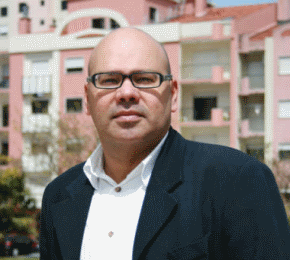Paulo Teixeira was born in Lourenço Marques, today Maputo, capital of Mozambique in 1962. He studied Geography and Regional Planning at the New University in Lisbon, and since 1997 has been an editor at »Relãmpago«, a literary journal, as well as board member of the Luís Miguel Nava Foundation, which annually presents a literature prize.
Teixeira is considered one of the most important Portuguese poets of his generation. His work has been translated into eleven languages and published in several journals and anthologies. His volume of poetry »Inventário e Despedida« (1991; Engl: Inventory and Farewell) was awarded the poetry prize by the Portuguese PEN Club, the Eça de Queirós prize by the City of Lisbon, and the Great Inapa Prize.
Teixeiras poems present a critical assessment of our times, fed by an arduous dialogue with the literary and cultural legacy of Europe. In his poems Teixeira insistently questions the value of European culture and the possibility of progress. Elegiac verses give expression to an apocalyptic fear of the end of Western civilisation.
In 1999 the volume »Túmulo de Heróis Antigos« (Engl: Tomb of Ancient Heroes), a collection of thirty-two poems inspired by the German Romantic painter Caspar David Friedrich, appeared. The latest of Teixeiras eleven books so far is »Autobiografia Cautelar« (2001; Engl: Prudent Autobiography).
Over the past six years Teixeira has taught Creative Writing at high schools as part of a special programme led by the Portuguese Ministry of Education. He temporarily lived in Berlin as a literary guest of the DAAD.
Source: lyrikline.org

